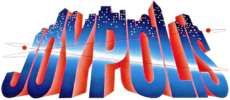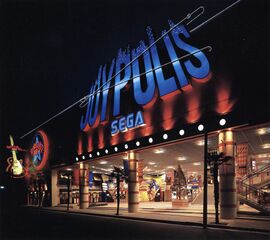Difference between revisions of "Niigata Joypolis"
From Sega Retro
m |
|||
| (7 intermediate revisions by 2 users not shown) | |||
| Line 1: | Line 1: | ||
{{VenueBob | {{VenueBob | ||
| logo=Joypolis logo 1994.png | | logo=Joypolis logo 1994.png | ||
| − | | venueimage= | + | | venueimage=Niigata Joypolis 1995.jpg |
| − | |||
| − | |||
| − | |||
| name= | | name= | ||
| location=新潟県新潟市八千代2丁目5番7号 新潟交通万代シティ, Japan | | location=新潟県新潟市八千代2丁目5番7号 新潟交通万代シティ, Japan | ||
| − | | opened=1995-12-09{{ | + | | opened=1995-12-09{{magref|ssmjp|1995-12|41}} |
| closed=2001-01-16{{ref|https://web.archive.org/web/20010602084138/http://www.sega.co.jp/sega/atp/niigata/}} | | closed=2001-01-16{{ref|https://web.archive.org/web/20010602084138/http://www.sega.co.jp/sega/atp/niigata/}} | ||
}} | }} | ||
| − | + | '''Niigata Joypolis''' (新潟ジョイポリス), later '''Magic City @ Niigata Joypolis''' (マジックシティ@新潟ジョイポリス), was a [[Joypolis]] amusement theme park opened by [[Sega]]. Originally opened in December 1995, its operations were later largely outsourced to foreign company Magic City Co. Ltd by April 1998 as a result of poor visitor numbers,{{ref|https://web.archive.org/web/20231203164439/https://www.ampress.co.jp/backnumber/bn1998.06.01.htm}} who permanently closed the park and Sega's remaining areas in January 2001.{{ref|https://web.archive.org/web/20010602084138/http://www.sega.co.jp/sega/atp/niigata/}} | |
| − | '''Niigata Joypolis''' (新潟ジョイポリス), later '''Magic City @ Niigata Joypolis''' (マジックシティ@新潟ジョイポリス) was a [[Joypolis]] amusement theme park opened by [[Sega]]. | ||
| − | + | ==History== | |
| + | The fifth venue to be launched under Sega's [[Amusement Theme Park]] concept and the second Joypolis, Niigata Joypolis opened in December 1995, occupying | ||
| + | 6,086m² of the Bandai City complex in Yachiyo, Niigata City.{{ref|https://web.archive.org/web/19961224105423/http://www.sega.co.jp/sega/atp/niigata/data.html}} Though it did not contain any newly-developed original attractions by Sega, the first ''IMAX Ride Film'' simulator in Japan was installed on opening day as the location's premier feature.{{magref|ssmjp|1995-12|41}} Like the original flagship [[Yokohama Joypolis]], a Café Blanca restaurant and SegaSonic & Tails gift shop operated as additional facilities, however due to the park's placement in a entertainment centre, other partnering food & drink outlets could be found in close proximity to its grounds.{{ref|https://web.archive.org/web/19961224105423/http://www.sega.co.jp/sega/atp/niigata/data.html}} | ||
| − | == | + | The park's numbers were reportedly sufficient in the first months of operation,{{magref|gamemachinejp|513|2}} however these are thought to have swiftly deteriorated. In the first restructuring of the Amusement Theme Park concept's venues since the discontinuation of the [[Galbo]] parks, Sega withdrew from operating much of the park in January 1998 and contracted a Japanese business named Magic City Co. Ltd. (A subsidiary of the Canadian-based International Leisure Systems (ILS)) to renovate certain areas, though continued to run some sections.{{ref|https://web.archive.org/web/20000816082345/http://www.sega.co.jp/sega/atp/niigata/}} Under its new ownership, the park was renamed Magic City @ Niigata Joypolis, losing several of its original attractions and décor on the ground floor in April 1998.{{ref|https://web.archive.org/web/19991011230616/http://www.sega.co.jp/sega/atp/niigata/MCtop.html}} A number of new restaurants and traditional theme park rides took their space.{{ref|https://web.archive.org/web/19991011204255/http://www.sega.co.jp/sega/atp/niigata/MCcharge.html}} |
| + | |||
| + | Magic City and Sega closed the park permanently in January 2001 after further management problems,{{ref|https://web.archive.org/web/20010602084138/http://www.sega.co.jp/sega/atp/niigata/}} and its space has since been redeveloped by Bandai City. | ||
| + | |||
| + | ==Attractions== | ||
| + | ===Original attractions=== | ||
{{multicol| | {{multicol| | ||
| − | *''[[AS-1]]'' | + | *''[[AS-1]]'' (09-12-1995 - 16-01-2001) |
| − | *''[[VR-1]]'' | + | *''[[VR-1]]'' (09-12-1995 - 16-01-1998) |
| − | *''[[Ghost Hunters]]'' | + | *''[[Ghost Hunters]]'' (09-12-1995 - 1996) |
| − | *''[[Mad Bazooka]]'' | + | *''[[Mad Bazooka]]'' (09-12-1995 - 16-01-1998) |
| − | *''IMAX Ride Film'' | + | *''IMAX Ride Film'' (09-12-1995 - 16-01-2001) |
| − | *''Alien Panic'' | + | *''Alien Panic'' (09-12-1995 - 16-01-2001) |
| − | *''Q-ZAR'' | + | *''Q-ZAR'' (09-12-1995 - 16-01-2001) |
| + | *''Crazy Travel'' (09-12-1995 - 16-01-2001) | ||
}} | }} | ||
| + | ===Later attractions=== | ||
| + | *''[[Ghost Hunters#Ghost Hunters II|Ghost Hunters II]]'' (1996 - 16-01-2001) | ||
| + | |||
| + | ==Magazine articles== | ||
| + | {{mainArticle|{{PAGENAME}}/Magazine articles}} | ||
==Gallery== | ==Gallery== | ||
<gallery> | <gallery> | ||
| + | NiigataJoypolis Exterior.jpg|Exterior circa 1995 | ||
| + | Niigata_Joypolis_Interior.jpg|Interior circa 1995 | ||
Niigata Joypolis Outside.jpg|Exterior circa late 1997 | Niigata Joypolis Outside.jpg|Exterior circa late 1997 | ||
Niigata Joypolis Inside.jpg|Interior | Niigata Joypolis Inside.jpg|Interior | ||
| − | Niigata Joypolis IMAX.jpg|IMAX Ride Film | + | Niigata Joypolis IMAX.jpg|''IMAX Ride Film'' |
| − | Niigata Joypolis Aliens.jpg|Alien Panic | + | Niigata Joypolis Aliens.jpg|''Alien Panic'' |
| − | Niigata Joypolis QZar.jpg|Q-Zar | + | Niigata Joypolis QZar.jpg|''Q-Zar'' |
| − | Niigata Joypolis AS1.jpg|AS-1 | + | Niigata Joypolis AS1.jpg|''AS-1'' |
| − | Niigata Joypolis VR1.jpg|VR-1 | + | Niigata Joypolis VR1.jpg|''VR-1'' |
| − | Niigata Joypolis GhostHunters.jpg|Ghost Hunters | + | Niigata Joypolis GhostHunters.jpg|''Ghost Hunters'' |
| − | Niigata Joypolis MadBazooka.jpg|Mad Bazooka | + | Niigata Joypolis MadBazooka.jpg|''Mad Bazooka'' |
Niigata Joypolis Psychadern.jpg|3D sound rooms developed by [[Human]] | Niigata Joypolis Psychadern.jpg|3D sound rooms developed by [[Human]] | ||
Niigata Joypolis Shop1.jpg|SegaSonic & Tails gift shop | Niigata Joypolis Shop1.jpg|SegaSonic & Tails gift shop | ||
| Line 48: | Line 59: | ||
Niigata Joypolis Flyer.jpg|Flyer front | Niigata Joypolis Flyer.jpg|Flyer front | ||
</gallery> | </gallery> | ||
| + | |||
| + | ==External links== | ||
| + | |||
==References== | ==References== | ||
<references /> | <references /> | ||
Latest revision as of 19:54, 9 January 2024

|

|
| Niigata Joypolis |
|---|
| Location: 新潟県新潟市八千代2丁目5番7号 新潟交通万代シティ, Japan |
| Opened: 1995-12-09[1] |
| Closed: 2001-01-16[2] |
Niigata Joypolis (新潟ジョイポリス), later Magic City @ Niigata Joypolis (マジックシティ@新潟ジョイポリス), was a Joypolis amusement theme park opened by Sega. Originally opened in December 1995, its operations were later largely outsourced to foreign company Magic City Co. Ltd by April 1998 as a result of poor visitor numbers,[3] who permanently closed the park and Sega's remaining areas in January 2001.[2]
Contents
History
The fifth venue to be launched under Sega's Amusement Theme Park concept and the second Joypolis, Niigata Joypolis opened in December 1995, occupying 6,086m² of the Bandai City complex in Yachiyo, Niigata City.[4] Though it did not contain any newly-developed original attractions by Sega, the first IMAX Ride Film simulator in Japan was installed on opening day as the location's premier feature.[1] Like the original flagship Yokohama Joypolis, a Café Blanca restaurant and SegaSonic & Tails gift shop operated as additional facilities, however due to the park's placement in a entertainment centre, other partnering food & drink outlets could be found in close proximity to its grounds.[4]
The park's numbers were reportedly sufficient in the first months of operation,[5] however these are thought to have swiftly deteriorated. In the first restructuring of the Amusement Theme Park concept's venues since the discontinuation of the Galbo parks, Sega withdrew from operating much of the park in January 1998 and contracted a Japanese business named Magic City Co. Ltd. (A subsidiary of the Canadian-based International Leisure Systems (ILS)) to renovate certain areas, though continued to run some sections.[6] Under its new ownership, the park was renamed Magic City @ Niigata Joypolis, losing several of its original attractions and décor on the ground floor in April 1998.[7] A number of new restaurants and traditional theme park rides took their space.[8]
Magic City and Sega closed the park permanently in January 2001 after further management problems,[2] and its space has since been redeveloped by Bandai City.
Attractions
Original attractions
- AS-1 (09-12-1995 - 16-01-2001)
- VR-1 (09-12-1995 - 16-01-1998)
- Ghost Hunters (09-12-1995 - 1996)
- Mad Bazooka (09-12-1995 - 16-01-1998)
- IMAX Ride Film (09-12-1995 - 16-01-2001)
- Alien Panic (09-12-1995 - 16-01-2001)
- Q-ZAR (09-12-1995 - 16-01-2001)
- Crazy Travel (09-12-1995 - 16-01-2001)
Later attractions
- Ghost Hunters II (1996 - 16-01-2001)
Magazine articles
- Main article: Niigata Joypolis/Magazine articles.
Gallery
3D sound rooms developed by Human
Promotional material
External links
References
- ↑ 1.0 1.1 Sega Saturn Magazine, "December 1995" (JP; 1995-11-08), page 41
- ↑ 2.0 2.1 2.2 http://www.sega.co.jp/sega/atp/niigata/ (Wayback Machine: 2001-06-02 08:41)
- ↑ https://www.ampress.co.jp/backnumber/bn1998.06.01.htm (Wayback Machine: 2023-12-03 16:44)
- ↑ 4.0 4.1 http://www.sega.co.jp/sega/atp/niigata/data.html (Wayback Machine: 1996-12-24 10:54)
- ↑ Game Machine, "1996-03-01" (JP; 1996-03-01), page 2
- ↑ http://www.sega.co.jp/sega/atp/niigata/ (Wayback Machine: 2000-08-16 08:23)
- ↑ http://www.sega.co.jp/sega/atp/niigata/MCtop.html (Wayback Machine: 1999-10-11 23:06)
- ↑ http://www.sega.co.jp/sega/atp/niigata/MCcharge.html (Wayback Machine: 1999-10-11 20:42)
| Joypolis venues |
|---|
| Current |
| Tokyo Joypolis (1996) | Shanghai Joypolis (2014) | Qingdao Joypolis (2015) |
| Former |
| Shinjuku Joypolis (1996-2000) | Niigata Joypolis (1995-2001) | Yokohama Joypolis (1994-2001) | Fukuoka Joypolis (1996-2001) | Kyoto Joypolis (1997-2002) | Umeda Joypolis (1998-2018) | Okayama Joypolis (1998-2018) | Joypolis VR Shibuya (2018-2020) |

















